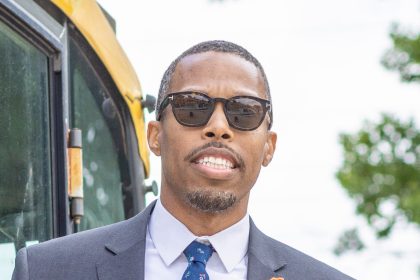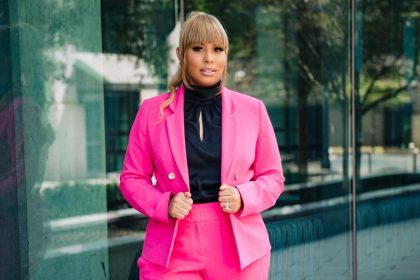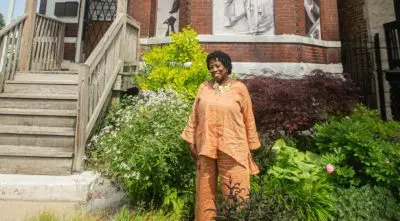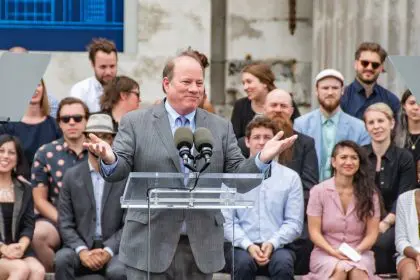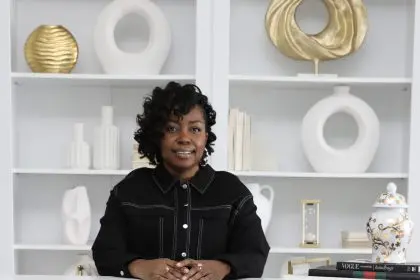Calvin L. Holmes has been president of the Chicago Community Loan Fund (CCLF) since 1998. CCLF is a nonprofit U.S. Treasury-certified community development financial institution (CDFI) with nearly $176 million in assets that provides responsible financing and technical assistance for community stabilization and development efforts that benefit low-to-moderate-income neighborhoods throughout metropolitan Chicago.
Under his leadership, CCLF’s lending is leveraging over 12,000 housing units, 7,000 jobs, and $1.9 billion in additional capital in 70 lower-wealth Chicagoland communities. CCLF has become one of the country’s largest single metropolitan area CDFIs. Holmes’s community development career spans more than 30 years, and he is a recognized expert in community development finance and issues involving access to capital. He is a past Chairman of the Community Development Advisory Board-CDFI Fund (appointed by President Obama). Currently, he serves on the U.S. Bank National Community Advisory Council, PNC Bank Advisory Board (Illinois), and the advisory board of the Chase New Markets Corporation.
Further, Holmes serves as Vice Chair of the newly-formed African American Alliance of CDFI CEOs, which aims to leverage its members’ resources to reduce the American racial wealth gap. He also serves on the boards of several additional national and local nonprofits focused on creating racial, social, and economic equity for under-resourced communities, including the Chicago Housing Trust (Treasurer), Southland Development Authority (advisor), Emerald South Economic Development Collaborative, Interfaith Housing Development Corporation (Secretary) and City of Chicago Community Wealth Building Advisory Committee.
Holmes is a 2003 Leadership Greater Chicago fellow who led CCLF to receive a 2009 MacArthur Foundation Award for Creative and Effective Institutions, a 2014 Alford-Axelson Award for Nonprofit Managerial Excellence, and a 2021 $10 million donation from MacKenzie Scott to further racial economic justice. He holds a master’s degree in urban and regional planning, with a concentration in real estate finance, from Cornell University and a bachelor’s degree in African American Studies from Northwestern University.
Munson Steed, the publisher and CEO at rolling out, recently caught up with Holmes for an engaging conversation.
[Editor’s note: This is an extended transcription. Some errors may occur.]
Munson Steed: Hey, everybody, this is Munson Steed! We are on CEO to CEO, where we introduce you to some of the best CEOs in the country. I am so proud to have Calvin Holmes, who is making a difference in the world by creating financial opportunities for those who may not have thought it possible. How are you, my dear brother?
Calvin Holmes: I’m doing just fine. It’s good to be here, Munson.
MS: When you think about people who don’t know what it is actually to have a community development organization, can you give them your title and share with them the mission of what you do?
CH: Sure, Munson. So, I’m Calvin Holmes, president of the Chicago Community Loan Fund. I’m really proud to run the organization. I’ve been here for 29 years. It’s been quite some time, and we are a community development financial institution. So, what we do is we work with bankers, the federal government, the state government, and other religious institutions and the like to take their investments and funnel them into lower-wealth communities to trigger economic development, housing development, community facilities, and social enterprises.
So, those people can have a higher quality of life. They can really believe in the communities that they live in. So, that’s our sole purpose, it’s just to simulate that economic development across six counties of Chicagoland.
How do developers get involved?
MS: For those individuals who really wanna know, what kind of advice could you actually offer to real estate developers trying to figure out how to get involved with you? Somebody who has a project that really serves the community that is underserved. What advice would you give them, and what can they know that they can lean on you for?
CH: My first piece of advice, Munson, would be to have a business plan. Don’t cut corners; get all elements of that business plan mapped out, and make sure that you do your homework on it. And then, don’t be so proud [that] you can’t have advisors around you. People who are experts in many industries that make housing and community development, and economic development push forward. Study your market [and] know what your competitive advantage is.
And be in constant communication with the network of lenders and grant providers, so that you have the release resources at your fingertips. And I know you know this, Munson, but you gotta have reliable contractors. You gotta be working with people who are credible.
MS: You talk about credibility; it’s beautiful when you can find it, and experience teaches you that. 29 wonderful years serving the community. Thank you very much for that. Can you literally kind of share some successes that you think about over time that people may or may not have really thought were a program until you figured out how to finance it and how to bring dreams and wealth-building to a community?
CH: Well, so that’s a tough question. Because over the past 29 years that I’ve been at the loan fund, we’ve had so many home runs, we really have. It’s been a really wonderful place to work, and we’ve had so many things to celebrate. From affordable housing, to community facilities, to commercial retail, and including social enterprises. So, when I think about a number of the high-profile projects that the Chicago Community Loan Fund have financed, things like the Stony Island on Arts Bank comes to mind, which was a deal that was being brought forward by Theaster Gates, who you know is a cause celebrity. He’s got his camp in Miami, where he sells very expensive art but he’s really a fun guy, very visionary. He’s a developer in his own right and he really planted his roots in the South Shore.
He calls it Grant Crossing, but he doesn’t know. It’s actually technically inside of South Shore, where he brought the Stony Island Arts Bank online. It was going to be demolished by the city of Chicago, and he raised his hand and said, “No, I can preserve that building. I’m gonna make it a gym someday,” and he stopped the city from tearing it down, and he came to us and borrowed some money for construction. I think he’s almost paid us back now, and it’s a wonderful facility. It’s a museum. It’s an art facility. It’s an exhibit space. I think he has an entertainment space in the basement of it, and it’s really doing well. And he also still went ahead and designed some affordable housing that’s a few blocks away. And he’s got a part of the neighborhood that’s got all kinds of artistic functions just another couple of blocks away, and then he’s developing an arts incubator a few blocks out.
So, that’s just one example of a high-profile, very successful project that we’re very proud to have been affiliated with, and at the time Theaster, as you know, is a wealthy man. So, he had money, and he had some money at Harris Bank, and he had some money at Northern Trust, and those bankers would not make the loan to him, and they could have. They said, “Well, we’ll make you a loan if you let us back the loan with every dollar that we have on deposit.” And he said, “No, I can leverage this, so I do not need to deal with you guys. I’m gonna find somebody who will give me some credit.”
The importance of credit-worthiness
MS: You think about the whole idea of creditworthiness and saving strategy for development organizations, their ability to secure finance — why is this important as it relates to increasing homeownership among black families?
CH: Well, I hate to say it, but when you’re looking at people who are in business, you know that they need to have a decent credit score. They need to have fiscal responsibility, and they need to show you, particularly as a lender, that they know how to manage their money. So, you need for them to demonstrate that they can put some skin in the game. We do at the Chicago Community Loan Fund, some pretty high leveraging.
So, for example, we can lend to developers who only have, I hate to say it, but sometimes we’ll make a loan to someone who only has 1% skin in the game. We’ll do that. As you know, a lot of traditional lenders will not touch a developer that can only put in 1% of the total project cost. But we’ll go there and we’ll help the customer out so that they can eventually build the kind of wealth that they need to be able to continue to expand what they’re doing.
MS: If you were thinking about the next brother or sister who was thinking about being a CEO of your organization, what would you share with them as a vision, as it relates to empathy, as a principle of how they operate?
CH: [It] is very important to make sure that you have the educational foundation to be really smart at the business that you’re going into, so that you can give good education to your team members. You can give good education to the people that you’re working with, like contractors, for example, so that they can build the kind of budgets that they need to go on and be successful. And to make sure that you have the wherewithal to be able to manage all the different programs that you’re gonna help bring to the table for the very clients [whom] you’re trying to serve. You can’t do that without being able to help them make connections to the city of Chicago and the LO Housing Development Finance Authority. You need to be able to bring that kind of information to them in real time and that’s a very important capability to have.
MS: What is your vision for real estate development’s role in enhancing home ownership and community development over the next decade?
CH: Boy, that’s a tall order. So, let me just say this. So, as a CDFI, we think about how can we invest in neighborhoods so that homeowners are drawn to those communities. I mean, as you know, Munson, all too well, a lot of time, particularly with African Americans, we have felt that we have hung in a neighborhood for too long, and we want to go to better markets, places that have stronger retail corridors and the like, so we can sometimes get in a habit of abandoning the city.
But we invest in lower-income neighborhoods and to try to reverse that cycle so that those businesses can actually cut that cycle off and have those people move back to the ‘hood and to have them feel proud of the home that they’re buying in the ‘hood, and then to use that to attract other homeowners to also buy properties in those neighborhoods.
So, eventually that cycle gets short-circuited and you start to have a cycle where the neighborhood is really on the mend, and the homeowners, and the commercial corridors are really feeding on each other to make for dynamism and vibrancy.
MS: Great. Last question. If you were giving a speech at a Howard or Morehouse or Chicago State, and you were going to challenge the next generation, what would the title of your speech be? And what would the two challenges that you would literally want them to take on as they move forward into their new life in their journey for community service?
CH: Why, Munson, these are really tough questions, brother. So, I would tell the young up and coming folks that, believe it or not, it’s really good to be studious. It’s great to buckle down and party a little bit, but not too much, and to really take your education very seriously, and to be as smart as you possibly can. Because across the planet there’s so many hyper-intelligent people that you’re gonna be competing with in the workforce that you really wanna make sure that you are the best candidate that they can try to recruit and then the other thing would be to approach life with an enormous amount of humility.
There is so much to be grateful for, and your leadership is going to help the world be a better place, and having that right amount of humility, will make you a stellar and outstanding leader for all of us.
MS: Good. Well, ladies and gentlemen, you heard it first. My dear brother Calvin Holmes, CEO, is a true gift to our community. Thank you for your 29 years of service. I’m Munson Steed, and this is CEO to CEO.
CH: It’s great to be with you, Munson.

